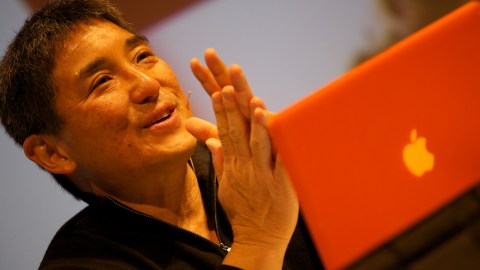Guy Kawasaki: How Nepotism Helped Launch My Career

What’s the Big Idea?
Former Apple “evangelist” and prolific author Guy Kawasaki says he first got his foot in the door at Macintosh because of who he knew, not because of his skill set. This led to a great career for Kawasaki. Might you be able to use the same networking tools as him? Is it ethical?
N.B. What Kawasaki is technically describing here is cronyism, not nepotism, since it was a friend, not a family member who helped him land a job. And yet, this does not change Kawasaki’s essential message. Short of doing something immoral, he says, you should get into a company “any way you can.”
Watch the video here:
What’s the Significance?
Nepotism, or favoritism based on kinship, arose out of necessity for Catholic popes and bishops who took chastity vows and therefore produced no (“legitimate”) offspring. The offices and titles they otherwise would have granted to sons went instead to nephews who were elevated in order to carry on a dynasty. The number of relatives who could be made cardinal was later capped in 1692.
Other reforms have been slower to come by, as those in power tend to be very keen to keep the empire in the family. In England, for instance, members of the House of Lords used to pass their seats to their sons until this practice was partially abolished in 1999. The practice will be fully abolished once the remaining 90 “hereditary peers” die off.
And yet, nepotism is still very much alive and well today. Sometimes it is even impossible to avoid. That may be because we are hard-wired to favor those closest to us. Think of a family business. The idea is to pass on what you know to who you know best, regardless of merit.
Nepotism has a much more negative connotation when it comes to joining an exclusive club or getting admitted to a competitive college. “Are you related to anyone who has ever worked for this company?” a job application might ask. Nepotism is great for those with the right pedigree.
Nepotism also tends to have a negative connotation as it usually implies that an individual would not achieve a certain job or position if the decision was based on merit alone. There are some legal protections against this, such as the Civil Rights Act of 1964 that outlaws discrimination on the basis of race, color, sex, religion or national origin.
Beyond the legal ramifications, what is our social tolerance for nepotism? As Adam Bellow (the son of Saul Bellow) wrote in The Atlantic, “Americans censure nepotism on the one hand and practice it as much as they can on the other.”
So where should we set our ethical barriers? Let’s consider this scenario: a college hires a new president and offers her husband a job to sweeten the deal. Are we OK with that? It depends. Did it prevent someone else from getting the position or getting promoted? And to stick with the example of an academic setting, consider that nepotism has helped increase the number of female professors. That’s a positive form of nepotism, right?
Here are some prominent examples of nepotism in recent history (which seem to abound in politics and entertainment):
How can nepotism actually be beneficial to a business or an organization? Let’s look at one famous example.
It is hard to dispute the talents and abilities possessed by Robert F. Kennedy. It is just as hard to dispute the fact that he received preferential treatment from his brother when he was appointed U.S. Attorney General. And yet, to look at it another way, RFK proved to be an enormous asset for his brother. As JFK’s most trusted insider, RFK helped the president govern more effectively. So one could argue that nepotism in this case was chiefly benefitting the employer (the president) much more significantly than the employee (the attorney general). Had RFK not displayed such a steady hand during the Cuban missile crisis, for instance, history would no doubt judge his appointment very differently.
One corporation, Costco, has recognized the value of hiring relatives. Simply put, the ties of kinship are closer than the ties between employer and employee. So when you put family members together in the work context, it is not surprising to learn that they will be more loyal and more dedicated, both to each other as colleagues and to the company as a whole (Ideally they will be more productive, but no one has proven that yet).
As online social networks increasingly dominate the way we network and advance our careers, nepotism and cronyism are practices that will perhaps grow increasingly blurry even as they become more ubiquitous. That doesn’t make it a bad thing. Your network may start with your family and close circle of friends, but then extends outward from there and is one of the most highly effective tools in finding a job or advancing your career.
Follow Daniel Honan on Twitter @Daniel Honan





